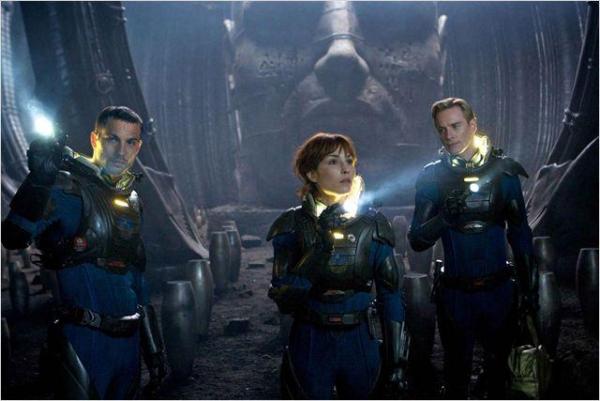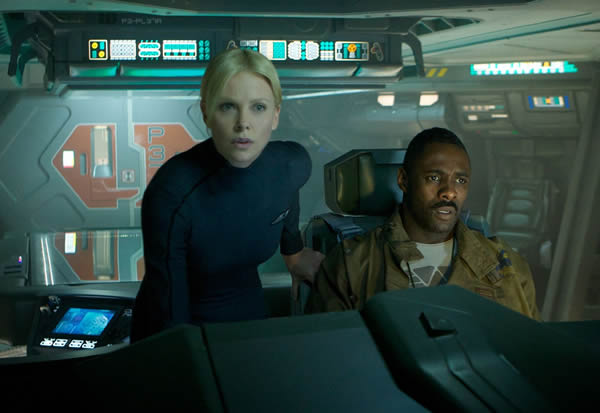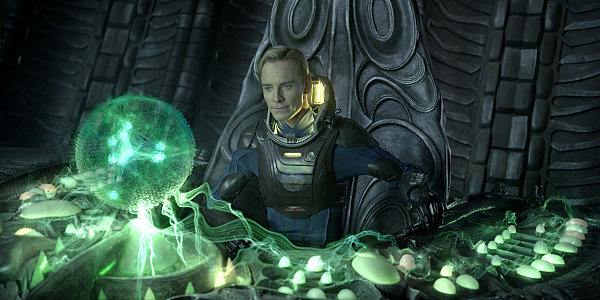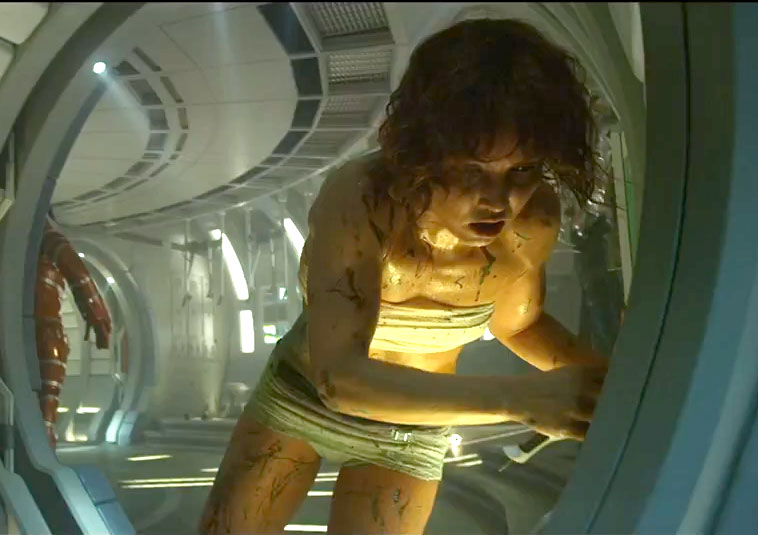Prometheus Review
A return to the “Alien” universe from the man who originally envisioned it? Hard not to sign up for that adventure, even knowing that “Prometheus” appears to be quite far from an “Alien” movie. This film dares to ask bigger questions about creation and the purpose of life while thrusting us into an un-fathomable sci-fi mystery rather than a moody horror opera set in space. Yet for every way it is different, “Prometheus” also feels like director Ridley Scott’s homage to his own work, as if he too was fascinated with the lore he helped create.
“Prometheus” begins with the slow unraveling of a world that despite the irony of phrase, feels vaguely familiar with all kinds of technology, stasis pods and the on-foot exploration of an unknown planet. The film completely propels itself on fascination, hoping that its audience has a strong scientific curiosity and a nose for wonder and imagination. The impact of “Lost” writer Damon Lindelof on the script is apparent, as with more knowledge comes more questions, questions that sometimes get in the way of themes and character building, but never stop awing.
The Prometheus (the ship) expedition is essentially launched on a hunch. Scientists and archaeologists Elizabeth Shaw (Noomi Rapace) and Charlie Holloway (Logan Marshall-Green) have discovered ancient drawings of a giant man pointing to a star cluster in ancient civilizations all over the world that couldn’t possibly be connected unless they referred to a creator. They believe a race of “Engineers” live on this planet (a moon, specifically), LV-223. Dying billionaire Peter Weyland (Guy Pearce) funded their quest in hopes of unlocking the greatest discovery in human history.
Unlike the Nostromo, Prometheus has a much larger crew, so there are many more stories to focus on and people to care about. In addition to Shaw and Holloway, there’s the ship captain (Idris Elba), the resident android, David (Michael Fassbender), and Weyland Industries overseer Meredith Vickers (Charlize Theron) among others. As they explore the pyramid-like structure they’ve discovered it becomes clear that there are multiple agendas going on here, which anyone who’s seen “Alien” would be prone to suspect.
The scope and scale of “Prometheus” and the way that this world is silently explored at the beginning echoes “Alien” rather closely, except that rather than narrow into a story of a dangerous alien on board a ship, the scope of “Prometheus” only continues to grow, with questions mounting on how these films — 33 years apart — ultimately connect. The answers are more exciting than profound, but the tension makes the ride worthwhile.
Like Ripley, it’s not until the final act that Shaw truly emerges as the main character we want to root for. From start to finish, it’s really David who fascinates the most. Fassbender gives another brilliant performance. His obvious hidden agenda complicates his character in our eyes, and for his cold and calculating manner, there’s still a creepy amount of internal processing going on. You get the sense that things interest him, that he’s driven by the same quest for knowledge of his human counterparts, and it makes him eerily human. He is, in a sense, a microcosm of the greater idea at play of mankind meeting his maker, as he is a creation of his peers, who look for answers about their creation. There’s a brilliant exchange between him and Holloway about how we create because we can — no other reason — yet as a sentient creation, it’s a maddening explanation for existence.
“Prometheus” should age well with these questions, as repeat viewings will eliminate the seemingly endless quest to figure out what’s going on and temper the abundant flaunting of production design and visual effects that can at times disorient the viewer. Without those distractions, the script’s brighter moments and thoughts will shine through much more.
There are no chinks, however, in the visual spectacle that is “Prometheus.” Everything is so believable, pristine and fascinating. Whereas “Alien” left so much to the imagination, “Prometheus” just keeps feeding it, and that’s the fundamental difference in the film as far as tone and genre. “Prometheus” goes into much more high-concept science fiction whereas “Alien” is predominantly horror. As such, those who loved “Alien” for its horror qualities will likely be the group most disappointed by “Prometheus.” Both films, however, contain lasting and memorable visual imagery.
Why so much comparison between the films? Well, “Prometheus” invites it. After all, the letters of the title appear line by line almost exactly as they did in ’79, first thing in the film. You can call it “Alien DNA” if you like (based on comments made by Scott and Lindelof), but story-wise it’s truly a prequel as it sets up/provides and explanation for the beginning of “Alien.” The reason Scott and Lindelof have avoided the direct nature of the word “prequel” is because of the tonal difference in their film and how “Prometheus” is driven by different (and much bigger) questions.
It seems that over the last three decades, Scott’s curiosity about the universe he and H.R. Giger designed in 1979 only grew. Rather than return to the “Alien” world to re-invoke the moody and atmospheric tone, he returned to it in hopes of expounding upon the lore that he had left so wide open with the fallen ship and the Space Jockey.
Pardon me for going way meta right now, but Scott’s journey back is for similar reasons to the characters of this film: a desire to understand its origins. His results are not all that different from their discoveries either, as “Prometheus” is striking, daunting, tense and messy, yet the prevailing drive of it all is a never-ending fascination.
4/5 Stars
Prometheus
Directed by Ridley Scott
Written by Jon Spaihts, Damon Lindelof
Starring: Noomi Rapace, Logan Marshall-Green, Michael Fassbender, Charlize Theron








0 Comments
You can be the first one to leave a comment.